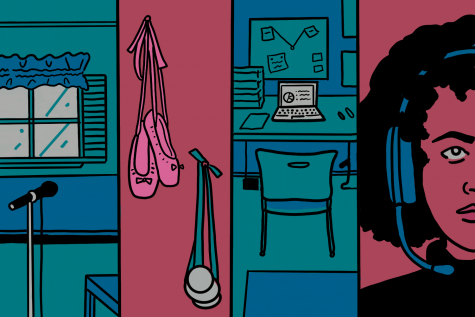Student organizations transform for online college experience
September 16, 2020

When the college first closed its buildings mid-March due to the coronavirus pandemic, student clubs and organizations were forced to make a quick switch to operating remotely.
For Emily Fischer, a senior marketing major and captain of the Columbia Renegades Dance Team, going remote basically ended their semester because of the lack of in-person interaction among teammates.
In-person rehearsals and performances were swapped out for almost no activity at all.
“When we went remote, we didn’t do very much,” Fischer said. “It was hard to get everyone’s schedules together.”
With the start of the Fall 2020 semester, Fischer and the dance team are once again finding themselves in the same position as every other on-campus organization: navigating the challenges that come with organizing remotely.
Fischer said the college is not allowing the dance team to rent out on-campus space for in-person rehearsals as a safety precaution, which will affect how they effectively function.
“You can talk to friends on Zoom, but it’s not the same as feeding off of someone’s energy,” Fischer said. “You can’t interact with other people if you’re in your own space.”
In response to not carrying on as planned, Fischer said the dance team will be much more informal during the fall semester.
Instead of having an official team that participates in performances and competitions, Fischer said the plan is to invite whoever is interested to have team workouts and “dance nights” over Zoom.
Paige Brunsen, senior cinema art and science major and president of the Editors Guild, said this semester the Editors Guild will be having weekly online meetings, Kahoot trivia nights and guest speakers talking about their experiences with breaking into the film industry.
Brunsen said members of the guild, which is a community of students interested in post-production for cinema, television and advertising, are trying to be optimistic about operating remotely and making the best out of a “bad situation.”
“It’s hard for everyone,” Brunsen said. “A lot of students right now just really need some kind of interaction with each other. We’re making this a space where we can talk about the difficulties that students are having.”
Despite being remote, Brunsen said members are still getting the full experience of being a part of the guild because they are doing the same activities, just in a remote setting.
Kin Marie, a senior marketing major and president of the Black Student Union, said in lieu of hosting weekly Zoom meetings this semester, BSU will be taking a media-based approach, releasing internet content on a daily basis to stay engaged with the Columbia community.
One of the content projects is a “cultural foods” series, where four members will come together and try new foods from different cultures and film their reactions, Marie said.
“We’re developing a way to create this online digital community that is active and consistent and provides a [virtual] space for incoming and current Black students to still feel like they have a community to connect with,” Marie said.
Despite the college enduring a “severe financial shortfall” for the 2020-21 academic year, as reported by the Chronicle Aug. 14, Coordinator of Student Organizations Stephaine Villanova wrote in a Sept. 11 email to SOC leaders that student organizations’ budgets this year will remain the same as last year.
“Student organizations will have the opportunity to apply for funding through SOPs [or Student Organization Proposals] and ask for ‘up to’ $1,400 this academic year,” Villanova wrote in the email.
Isaiah Moore, senior television and cultural studies double major and president of the Student Organizations Council, said SOPs specify the amount of funding requested from the council and how it will be used.
Marie said a downside of having to change course for the upcoming semester is that the BSU cannot host its biggest event of the school year, “Black Out,” a dance party usually held to kick off the school year.
Although no official event is scheduled in its place as of publication, Marie said the BSU is considering throwing a socially-distanced event called “The Cookout,” where designated spots would be set up in Grant Park and students can bring picnic blankets to enjoy food and live music while social distancing.
Justus Hightower, a junior filmmaking major and SOC representative for BSU, said despite operating remotely, he has never questioned whether he wanted to remain in the organization.
“I made my decision about joining BSU long before [the campus shutdown], and my level of excitement for being a part of the organization was way too high to be mitigated by [being] remote,” Hightower said. “Any way that I can be a part of the community, I want to be.”
Freshman playwriting major Logan Czernia, a new member of the Trans Student Union, said he joined the organization because it is an easy way to meet people while not being able to socialize with other people on campus. The organization is not affiliated with the college, but Columbia students are free to join, according to the Student Diversity and Inclusion website.
The remote nature of the organization is no issue to Czernia, though, as he has made friends over the internet since he was 12 years old.
Moore said they still encourage students to join on-campus organizations, despite the lack of in-person events and interaction.
“I think it’s really important for students to see what the college has to offer in terms of student organizations,” Moore said. “If we don’t have something that necessarily fits who you are, or if [nothing] stands out to you, you can always start your own.”







